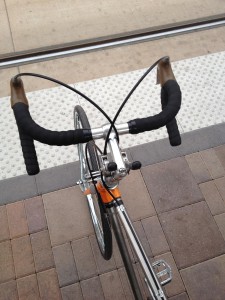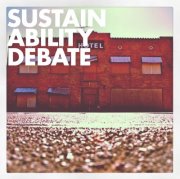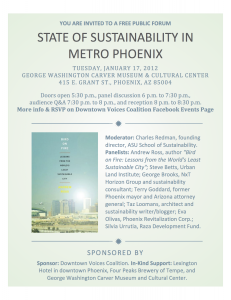 My friend Taz Loomans, the writer and former Phoenician, wrote a piece yesterday in which she compared the most urban elements of Phoenix to just less than a suburb. In Taz’s words:
My friend Taz Loomans, the writer and former Phoenician, wrote a piece yesterday in which she compared the most urban elements of Phoenix to just less than a suburb. In Taz’s words:
“[This] last time I was in Phoenix, visiting after living a couple of months in Portland, I realized Phoenix does suburbia exceedingly well. But it offers almost no urban life. And what passes for urban life in Phoenix is really a slightly less suburban version of suburbia. This makes me wonder – instead of trying to swim against the tide of decades of infrastructure and decades of suburban culture and values, why not just embrace suburbia full force?” [from “Is Phoenix a City of Just a Big Suburb” / bloomingrock.com]
Part of me says that she’s right. Compared to other urban environments the size of Phoenix — Seattle, Minneapolis, and Portland are examples that quickly come to mind — we are far from urban. One wonders if we’ll ever become a truly urban city on the size and scale of these cities. Phoenix came of age during the era of the automobile being the main driver for design and development. It’s not an indictment of Phoenix per se; however, it’s a design reality that contemporary urbanists seem to ignore.
I commented on the piece and on Facebook that I don’t believe that Phoenix will become an urban environment on the scale of Seattle, Minneapolis, and Portland. But instead, I think we’ll move to embrace the twenty-minute city. (The twenty-minute city is defined as places to work, shop, play, and eat that are a twenty-minute public transportation trip, bicycle ride, or walk from one’s residence.) As one of those weird Phoenicians without a car, I have my own twenty-minute city. By migrating my belief system to this instead of wanting wholesale urbanism across central Phoenix, I’ve come to appreciate this city more. Of course, we have much to improve in the areas of sustainability, density, diversity, and promoting a desert urbanism.
But my thoughts and feelings on urban Phoenix aren’t the point of this piece. As was to be expected, the usual blind boosters of Phoenix were quick to denounce Taz’s comments as a disaffected former Phoenician who has quit trying to make Phoenix better by moving to Portland. (Their thoughts and words, not mine.) Some of the most cogent analyses of Phoenix and the issues facing Phoenix have come from former Phoenicians. In addition to Taz, the writings of Jon Talton quickly come to mind. His writing may be harsh at times; however, his writing is permeated with the reality that we in Phoenix need to heed. One also thinks of the book Bird on Fire: Lessons from the World’s Least Sustainable City by Dr Andrew Ross, the NYU professor of social analysis.
We Phoenicians are terrible at taking criticism. Terrible at it. Instead of debating and discussing ideas to make our part of the world better, we summarily dismiss ideas based on the people who have offered those ideas. As a native Phoenician, it was harsh to read through Bird on Fire. But it was the best-researched tome on Phoenix history that I have read ever…hands down. The scope of Dr Ross’s research as well as the people and organizations he interviewed were spot-on. And as for my friend Taz: because she no longer lives in Phoenix does not mean that her thoughts and ideas on urban living in Phoenix are now less valid.
Phoenix will never become Portland (to which I say thank goodness!) but there are elements of Portland’s urbanism that we can adapt for Phoenix use. We’ll never be Seattle or Minneapolis, which is okay, but we can take the elements of their citizens’ strong civic engagement in their cities’ design and policy processes. We can take some of the advocacy that has made these urban areas the best and apply them to our city, county, and state policymakers and elected officials. Just because someone has left Phoenix (or is not from Phoenix) does not make their viewpoints less valid.
Let’s debate ideas, not people.
 Great conversation tonight at day 3 of Phoenix Urban Design Week.
Great conversation tonight at day 3 of Phoenix Urban Design Week.
 PHOENIX, Arizona – A panel of local experts and Andrew Ross, author of “Bird on Fire: Lessons from the World’s Least Sustainable City,” will discuss the current state of sustainability in metropolitan Phoenix at a public forum on Tuesday, January 17, 2012. The event, free to the public, will be held at the George Washington Carver Museum & Cultural Center at 415 E. Grant Street. Doors open at 5:30 p.m., panel discussion 6 p.m. to 7:30 p.m., audience Q&A 7:30 p.m. to 8 p.m., and reception with complimentary refreshments 8 p.m. to 8:30 p.m.
PHOENIX, Arizona – A panel of local experts and Andrew Ross, author of “Bird on Fire: Lessons from the World’s Least Sustainable City,” will discuss the current state of sustainability in metropolitan Phoenix at a public forum on Tuesday, January 17, 2012. The event, free to the public, will be held at the George Washington Carver Museum & Cultural Center at 415 E. Grant Street. Doors open at 5:30 p.m., panel discussion 6 p.m. to 7:30 p.m., audience Q&A 7:30 p.m. to 8 p.m., and reception with complimentary refreshments 8 p.m. to 8:30 p.m.